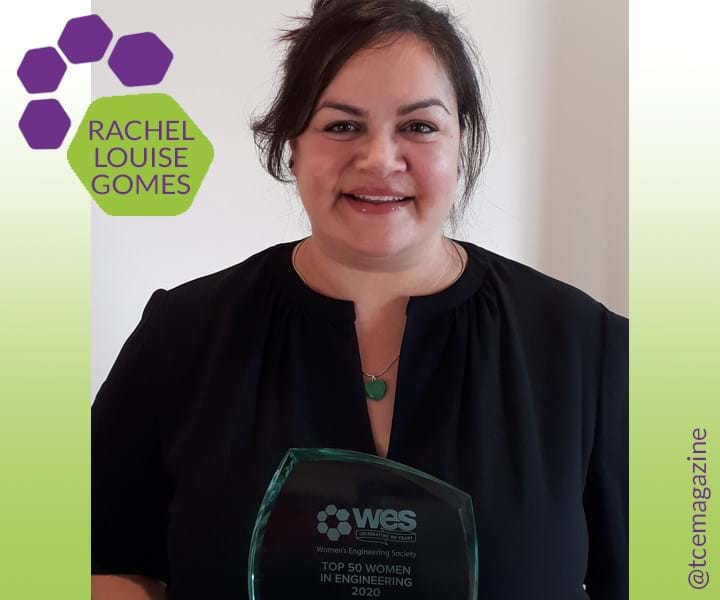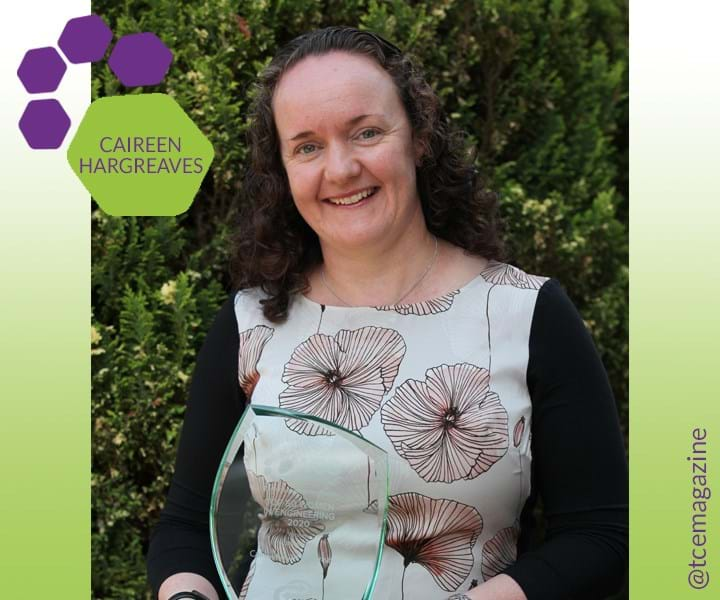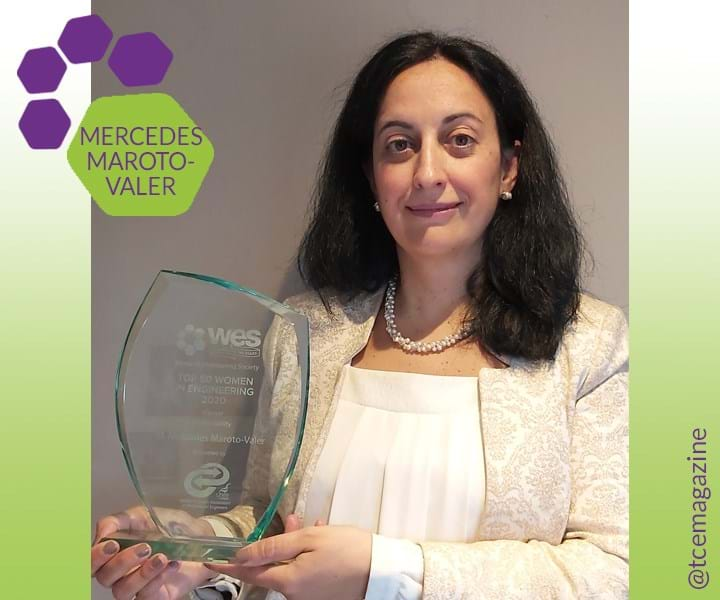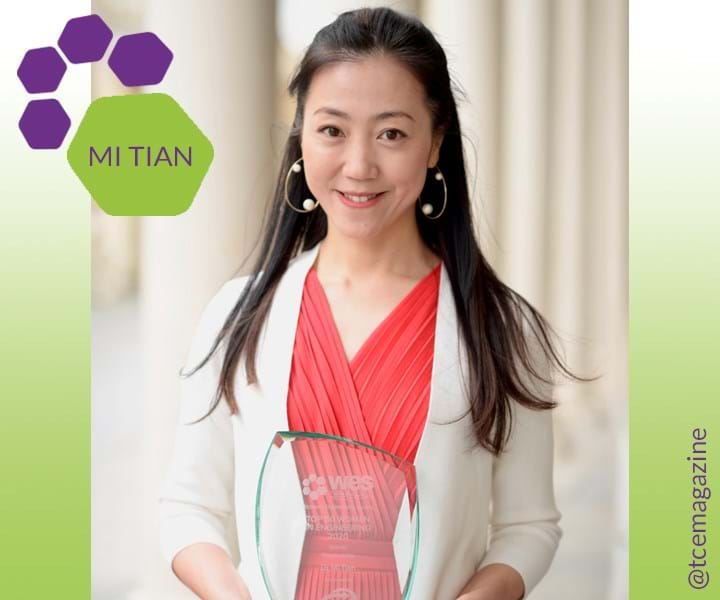INWED: Female chemical engineers recognised for green leadership
AS celebrations get underway for International Women in Engineering Day (INWED), we caught up with the six chemical engineers who today were announced as winners of the Top 50 Women in Engineering, for their work on sustainability.
The awards from the Women’s Engineering Society (WES) have been given to IChemE Members Yasmin Ali, Rachel Gomes, Caireen Hargreaves, Mercedes Maroto-Valer, Mi Tian, and Valeska Ting. They are among 50 engineers whose work supports the UNESCO’s Sustainable Development Goals or Net Zero Carbon Programme.
Elizabeth Donnelly, CEO of WES explained why this year the organisation had chosen to celebrate efforts to boost sustainability: “The 2019 Climate Emergency Declarations followed unprecedented weather conditions across the planet. Engineers were instrumental in repairing the [UK’s] Toddbrook Dam after it collapsed in August last year, and it will be engineers who will provide many of the solutions needed to address the UN’s Sustainable Development Goals. We felt that it was the right time to showcase the amazing women who are already working on these issues.”
Below, we profile the six winners from the chemical engineering community, and in line with this year’s INWED theme, ask how their work is helping to #ShapeTheWorld.
These interviews have been edited for length and clarity.
Yasmin Ali, Energy Innovation Project Manager, UK Government, Department of Business, Energy and Industrial Strategy

Q: How is your work supporting sustainable development?
A: My job is to manage government funding for energy technologies that will help us to reach the 2050 net zero target. I’m focussing on low-carbon hydrogen production at the moment; this is something that the Committee on Climate Change and others have highlighted as key to enabling the UK to reach net zero.
Q: The awards coincide with INWED, and this year’s theme is “Shape the World”. How are you contributing?
A: I have spent the last ten years in the energy sector. My work contributes to the secure energy supply that all of us rely on. My work on energy innovation now is helping to shape the world by paving the way for a more sustainable energy future. I also regularly write articles about engineering, and present at schools and events, spreading positive messages about the work engineers do. I hope that this will inspire the next generation of engineers and attract a greater diversity of people into the profession.
Q: For younger engineers just starting out on their careers, what is the key piece of advice you would share?
A: Stick with STEM, it opens many doors, and be open minded to the myriad of careers out there. Give engineering a chance, don’t instantly dismiss it; it has lots to offer below the surface. When I was younger I worried too much about making a decision about the exact job I wanted to do for the rest of my life, a very daunting task. I realise now that it is an iterative process, you can try out different roles and learn from each one until you find a good fit. Graduate schemes are great for this because they give you the chance to move around different areas of a company.
Yasmin Ali is a regular contributor to The Chemical Engineer, speaking to fellow chemical engineers about the fascinating career paths they have taken. Read Yasmin’s series here.
Rachel Gomes, Associate Professor, Chemical and Environmental Engineering, University of Nottingham

Q: How is your work supporting sustainable development or efforts for Net Zero?
A: My research is about delivering resilient and secure resources by enabling resource reuse in process environments and value recovery from waste streams. I have a particular interest in wastewater, which is a bit of a misnomer, because there is no such thing as “waste” water. Water in all forms has value, and “wastewater” actually contains many materials that once processed are valuable. Resource resilience is embedded throughout the UN SDGs and I look at technology development and analytics to remediate pollutants in wastewater treatment and rivers through to intelligent resource use in process manufacturing environments.
Q: How is your work helping to shape the world?
A: I feel that how we can shape the world and address societal challenges requires a focus on community and communication, in addition to technical skills and expertise. For instance, at the University of Nottingham we have the Water Works Interdisciplinary Research Cluster, which is a 140-strong team of researchers spanning our three international campuses. Challenges can be global and local, ranging from increasing urbanisation and resource shortages through to natural and man-made disasters. Most recently, Water Works was featured in Nottingham’s 2028 Climate Action Plan about nature-based solutions, supporting its commitment to be the UK’s first carbon neutral city.
Q: What advice would you give to your younger self?
A: Ask questions and challenge, even if you lack confidence, as that seems to come later. Be curious and look for opportunities to learn from, and share knowledge with others. Most importantly, one my parents taught me, is to follow your heart and passions, even if it is wastewater.
Q: Is there anything else you’d like to say related to STEM, or diversity more widely?
A: More a comment and clearly seen from the recent @STEMAZING1 video on Twitter where they asked 100 schoolgirls what they thought of engineering – it is clear that the perception of engineering as held by many people, and not just schoolgirls, is a significant barrier to encouraging diversity in STEM. How can we better share our community and communicate with the general public and their children beyond what can often be a focus on high schools and secondary school-aged individuals?
Caireen Hargreaves, Associate Director Product Sustainability, AstraZeneca

Q: How is your work supporting sustainable development?
A: Working in AstraZeneca’s Global Sustainability team I am leading various aspects of our programme that support the UN SDGs. In particular, for SDG12 – Responsible Consumption and Production – I led the development of a resource efficiency target, inspiring scientists and engineers to consider sustainability as they develop future commercial manufacturing processes. I coordinated AstraZeneca’s industry-leading safe pharmaceutical discharge programme for internal/external manufacturing sites and ensured the inclusion of associated KPIs within the AstraZeneca Annual Report. I advocated for and co-developed a programme within the company’s External Sourcing function to drive improvement in environmental performance with third-party suppliers.
Q: How is your career as an engineer helping to shape the world?
A: As I have spent most of my career working in the area of environmental sustainability, for me the theme “Shape the World” – or as I interpret it literally, “Protect the Planet” – echoes the traditional definition of sustainable development, ie development that meets our own needs without compromising the ability of future generations to meet their needs. As a chemical engineer I have always tried to ensure a whole systems thinking approach, and to support the recently-announced AstraZeneca Zero Carbon Strategy this work becomes even more critical to understand carbon emissions across pharmaceutical value chains and highlight priority areas for urgent action.
Q: For younger engineers just starting out on their careers, what is the key piece of advice you would share?
A: An intern I mentored recommended I read Sheryl Sandberg’s book Lean In, in the year I returned to work after maternity leave. I wish I had read this book as a student or young graduate as it resonated so much with me. I would also recommend, if you get the chance to work abroad or any other exciting development opportunity, to take it. I had the chance to live and work in Sweden for four years early in my career and I gained so much from both a personal and professional perspective during that time.
Mercedes Maroto-Valer, Champion UK Industrial Decarbonisation Research and Innovation Centre (IDRIC), Heriot-Watt University

Q: How is your work supporting sustainable development or efforts for Net Zero?
A: Over the last 25 years, I have built my leadership in engineering and sustainability across higher education institutions in the UK and US. Since a very early age I have been passionate about the environment, and I consider myself very fortunate to have been able to translate this passion into my vocation in energy research and sustainability. My research focuses on addressing global challenges to ensure the sustainability of resources and energy.
Q: How is your work helping to shape a greener world?
A: My team has recently received the Institution of Engineering and Technology (IET) 2019 Transport Innovation Award and we were also British Airways BA 2119: Future of Fuels challenge finalist for our work to develop sustainable aviation fuels to power long-haul flights. Our unique process can produce 2.4m t/y of aviation fuel for aviation and it is estimated that this would be the equivalent of taking more than 3m cars a year off the road.
We have demonstrated a ground-breaking process to recover waste heat energy from data centres and convert into zero-emission cooling and power provision, resulting in a 50% reduction in cooling energy consumption. The technology innovation is now moving to build and deploy an ultra-green data centre facility in Malaysia.
Earlier on this year, I was appointed as UKRI’s Industrial Decarbonisation Champion, and I am working with industry and leading experts to decarbonise the UK’s six biggest industrial clusters.
Q: What is your advice for younger engineers just starting out?
A: Believe in yourself. Do not put limits to what you can achieve, just because it has not been achieved before!
I want talent to be my biggest legacy. The challenges we are facing are greater than ever and addressing them requires that we harness and nurture all talent to realise their full potential.
In The Chemical Engineer’s July/August issue, we feature an op-ed written by Mercedes on how the chemicals industry can contribute to the UK achieving its net zero targets. Read it in full here.
Mi Tian, Lecturer, University of Exeter

Q: How are you contributing on sustainability?
A: My research interests and expertise lie in engineering materials for hydrogen storage. Hydrogen energy is playing a key role in the decarbonising the energy system and achieving Net Zero by 2050 in the UK, which is the heart of the UK’s current Industrial and Clean Growth Strategies. I have significantly contributed to the project “Engineering Composites for Sustainable Hydrogen Energy”, which has greatly impacted on the hydrogen tank industry, sustainable energy and the policymaking.
My research has benefitted from close ties with industry for sustainability. I led the project on the design of a plasma reactor that was successfully commercialised with GasPlas, which has had a direct impact on sustainable production of activated carbon and hydrogen. These interactions have helped to inform and direct my research and provide opportunities for sustainable manufacture and large-scale material testing.
Q: How is your career as an engineer helping to shape the world?
A: Having been inspired by many women engineers at the early stage of my education, I have been taking active steps to help forge equality within the engineering sector and to encourage more women and girls to consider a career in engineering. As a STEM ambassador, I have been leading the YouTube channel “Fun Science Club” for primary school children and taking part in the STEM activities regularly. I believe that women will bring fresh ideas, varied experiences, new perspectives and different ways to innovation in the engineering sector that is still dominated by men.
Q: What is the key piece of advice you would share – perhaps a lesson you wish you’d been able to share with your younger self that would have helped you in your career?
A: Be open-minded and be a sponge. I’m fortunate that I am supported by my family and the university, and was surrounded by experts including top women scientists and engineers at the early stage of my career. Don’t be afraid to ask for support. Most people are willing to help.
One thing that I would have to tell my younger self is to be brave and don’t be afraid to fail. Failure is a precondition for success. Try your best, accept the failure and do it better.
I would like to add that engineering is an innovative, exciting and challenging field, which impacts on everywhere and everybody. So it is vital that the engineering sector draws up and reflects the diverse societies it serves. Engineering is a viable and rewarding career for both men and women.
Valeska Ting, Professor of Smart Nanomaterials, University of Bristol

Q: How is your work supporting sustainable development?
A: I lead a research team that is working on the development of materials-based systems for storage of hydrogen, which is a zero-carbon fuel that can be used in transportation. By conducting research into how we can safely and efficiently store hydrogen onboard vehicles, we are helping to provide underpinning technologies to allow alternative energy vectors such as hydrogen to come into future widespread use.
Q: The awards coincide with INWED and this year’s theme is “Shape the World”. How are you contributing?
A: In addition to active research into sustainable energies, I also do a fair share of engineering outreach, I help to train researchers and I’ve also contributed to developing programmes for mentoring and peer support of early-career researchers in engineering. In all of these activities I try to emphasise the importance of responsible innovation and sustainability. I think that building this awareness and emphasising that sustainability is absolutely fundamental in everything that we do will encourage the next generation of engineers to make responsible decisions.
Q: If you could go back in time and give yourself careers advice, what would you say?
A: In terms of advice for my younger self or for anyone starting out in engineering, my advice would be to always be willing to learn something new!
There are times where you may feel way out of your depth, but don’t let that stop you from taking opportunities. Take the leap – you don't learn as much by standing still!
To learn more about how chemical engineers are helping to shape the world, watch this video from IChemE featuring women working across sectors and the world who are contributing to help solve global challenges.
Recent Editions
Catch up on the latest news, views and jobs from The Chemical Engineer. Below are the four latest issues. View a wider selection of the archive from within the Magazine section of this site.




